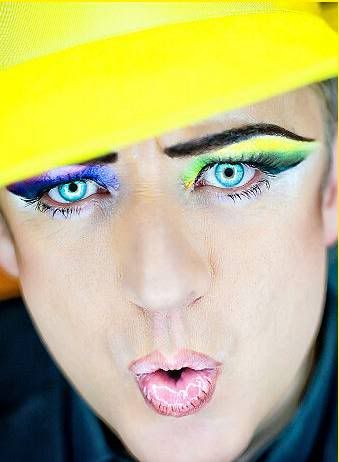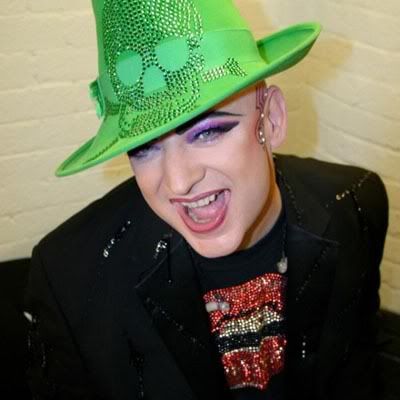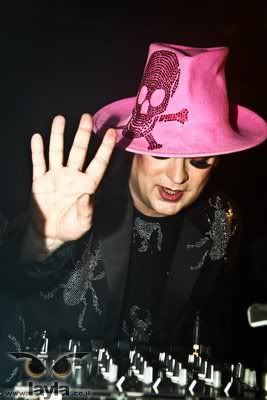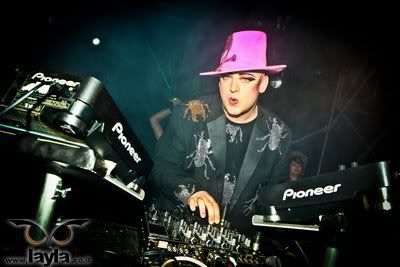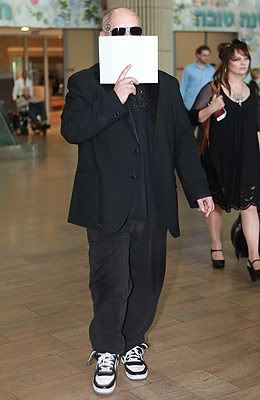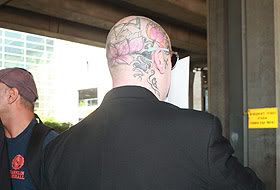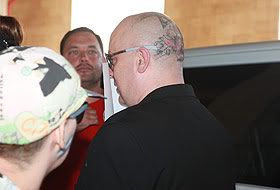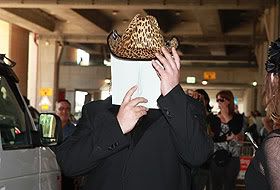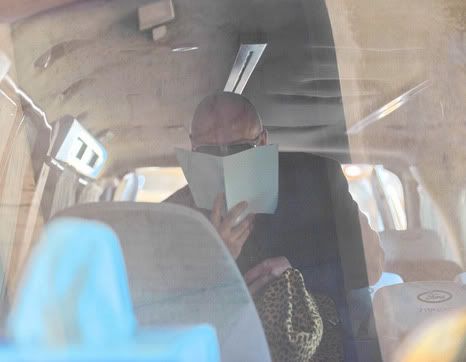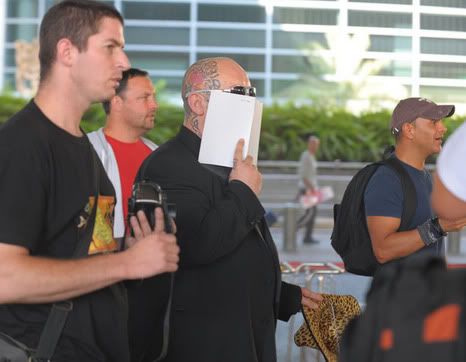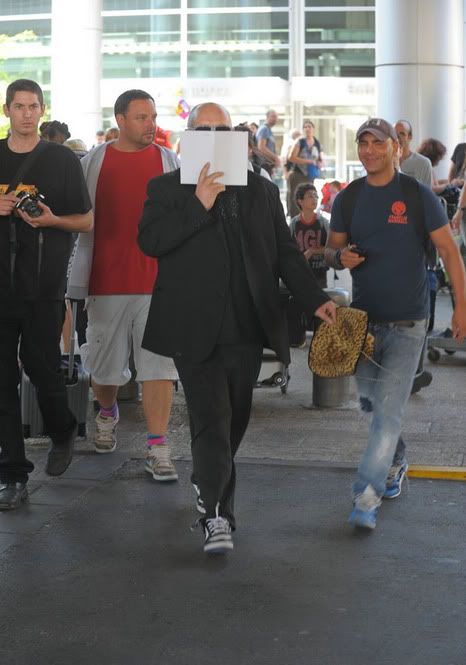-
-
Par dominic1 le 5 Septembre 2010 à 20:31

British pop star Boy George popped into Phuket in May, spending a couple days touring the island, and a couple of hours performing at Seduction Discoteque in Patong on the 26th.
His first time in Thailand, George said he was very much enjoying life in one of the luxury villas at Ayara Hilltops Resort & Spa overlooking Surin Beach, although he admitted to “mostly hiding from the heat”.
“I melt for my art,” he quipped, as beads of perspiration appeared and threatened to ruin his white-powdered face and artistically applied make up, which included a black lightning bolt down the left side of his face, topped off with a shocking pink affair decorated with a skull and crossbones of red sequins on the side.
“This is by an Irish designer called Phillip Tracey. It’s probably the only thing I really spend any money on. Everything else is very threadbare and cheap,” he said.
Boy George’s flambouyant, androgynous style of dress – always with a hat – quickly became his trademark in the 80s, and one which he perpetuates today.
“I only travel with one hat these days, because the last time I travelled with lots of hats (each in a separate box) they kept getting lost. On the last tour I did, I literally lost my luggage five times. It just gets to the point where it’s easier just to bring one and wear it all the time,” he said.
Born George Alan O’Dowd in 1961, the singer-songwriter shot to fame in the 80s as the lead singer of Culture Club with the hit song, Do you really want to hurt me?, which reached number one in several countries.
Since his eighties success and depature from Culture Club to follow a solo career, ‘Boy George’ has become a brand name in its own right, which George has continually worked at keeping alive through a dedicated fan base following his prolific creative career, which includes fashion design and other artistic escapades.
Theses fays, George alternates between singing and Djing. After his DJ tour, George is set to immediately begin another singing tour in Europe.
“I’m lucky that I have a job I enjoy,” said George. “My set tonight is kind of a party set. When you’re playing somewhere hot, it’s good to play things people know, but there’ll be a few surprises.
“Djing is obviously different to singing. With singing you can take people through lots of emotions, but when you’re Djing, people want to have a good time. You can’t really make people cry in a club. It’s more about putting them on a high.”
Commenting further on the difference between performing live on stage with a band and spining discs, he said: “You have to love music to be a good DJ. You can’t just do it for the sake of doing it. I’ve been doing it for 17 years and I still love it, otherwise I wouldn’t be doing it – I certainly wouldn’t be sitting here in Thailand in full drag if I didn’t really enjoy my job, you know?”
“DJing and singing are two careers, really. I just started doing DJing as a bit of a joke – a bit of fun. I was playing in a chill out room for some friends of mine who wanted someone to play old records. After that, I got more offers of work, so I decided I’d better learn how to DJ. So I’ve been doing it in public for the last 17 years.”
“I have 100 percent control over what I do, which is why I don’t really have a musical career. I mean I still play live and stuff, but I don’t make records that get played on the radio – people play my old stuff. I mean I still make records – it doesn’t stop me doing what I want to do.”
“ I think if you want to maintain a successful career for a long time, you have to keep making compromises. All of my peers, they aren’t necessarily making the records they want to make. They are making the records they have to make, or feel obliged to make. And that’s the difference between them and me. If something’s a hit, great, but if it isn’t, it doesn’t mean it’s going to stop me making more records.”
George puts his continued success down to a dedicated fan base, which he keeps in touch with on line through his website and with regular updates on Twitter.
“I’m really lucky to have a really loyal audience. For example, while I’ve been here, I’ve been emailing this fan for mixes of things I didn’t have.”
With that, George began to make a move to go and entertain the audience waiting patiently at Seduction Discoteque to see what George had in store for his one-night performance.
Despite already being way over fashionably late for his 10pm start at Seduction, George graciously took the time to chat with a few fans, one of whom had managed to dig out one of Boy George’s solo vinyl albums from 1988, “Tense Nervous Headache”, which George happily signed with a big, angular scrawl in black marker pen.
“I’ve loved Culture Club and Boy George since their debut album in 1983. I honeslty never thought that I would ever have the chance to meet him, but anything is possible in Phuket! He’s fantastic. A real star,” the fan said.
Boy George is scheduled to perform four pieces of music for a series of Night of the Proms concerts accompanied by a 70-piece symphonic orchestra in Belgium, the Netherlands and Germany from October to December. The star studded performances will also include well-known singers such as Sting, Andrea Bocelli, Mike Oldfield, James Brown and Chrissie Hynde.
 votre commentaire
votre commentaire
-
Par dominic1 le 5 Septembre 2010 à 20:29

Contrary to what Boy George may think, homosexuality is deep-seated in Lebanese culture – but it's not like it is in the west
In 1997, when Boy George shouted at his concert in Beirut: "Lebanon needs a dose of camp!" did he know what he'd bargained for? The gay scene in Lebanon has certainly changed during the last 13 years, but the real challenges are still ahead.
Not that the camp wasn't there already. In a small, unsophisticated Beirut bar, a group of cross-dressing men had organised a party in Boy George's honour. However, the Lebanese concert promoter prevented him from going there, after he deemed the place not "classy" enough. At the time, it was a brave move of these cross-dressing men, as such parties were still very much underground.
Decades of religious hypocrisy and political moralism had taken their toll. Police harassment and blackmail were frequent, thanks mainly to a law inherited from French rule. Many gay men sought political asylum in the west. But only the poor and "unconnected" faced these problems. The rich and powerful gay population had nothing to fear, as it threw its parties in "classier" venues.
In recent years, Lebanese gay men and women have become more visible in public places and the media. And there is less fear of harassment since the anti-homosexuality law is no longer really applied.
But how much have things truly changed? A stone's throw away from an infamous police station where gay men were humiliated and interrogated (for things such as wearing makeup) just a few years ago, a gay "bear" club has opened, which refuses entry to any "effeminate-looking" men.
Lebanese society is very macho. "In Lebanon they like to humiliate you," my friend Chadi told me, after he went to live in Bahrain, where he feels much more respected. "Gay" in Lebanon is usually applied to feminine-looking men, and their lives can be a long trail of taunting, harassment and abuse.
Although same-sex relations are very common among Lebanese men, most of their efforts go into trying to deny them. And a "gay-looking" man automatically becomes a pariah, or at best a sex object, with very limited social rights. This is especially true in Christian communities (where I was raised).
But this "manly love" is not always hidden. Sometimes it expresses itself in a very demonstrative way, at least in less "educated" milieux. Many Mediterranean men, despite their religious upbringing, will gladly revert to their pagan origins, to the Dionysian pleasures of yore.
The fact remains that lines between "gay" and "straight" are very undefined in Lebanon. That doesn't mean openly gay men are always respected but it does mean that there is no organised homophobia as one can find in some western countries. As for the pariahs, many of them succeed in transforming their situation into positions of power: they become adulated drag queens, artists … or priests. In fact, they are at once despised and revered, feared and secretly admired. They become "glorious pariahs" of sorts.
In this setting, what can be done to enhance the situation of the gay Lebanese? Organise a gay pride event?
Why not remove the gay shame instead? Phoenicians and Romans had no need for gay pride because they had no gay shame in the first place. And if the rich and "westernised" Lebanese dared venture into more working-class streets, they would see real gay pride in action, not just rainbow flags being waved once a year. In fact, a gay pride day would probably look like the icing on the McDonaldisation cake, now that Lebanon has its shopping malls, Big Brother-style TV programme and … its surveillance cameras. On every street corner. And in and around gay hangouts. The question is not: what does the gay crowd have to hide? But rather: why should it be made to show everything? And who is behind the cameras? Could it be the same policemen who "interrogated" gay men a few years ago, subjecting them to "anal tests"?
Advocate for gay rights? Some groups have taken a positive step in this direction. However, the language and concepts they use seem to be copied from the "little pink book" of western advocacy groups and are sometimes unadjusted to local gay realities. For instance, some of them call for more "public displays of affection" in a society that is already very homoerotic.
That the rainbow flag has become yet another global brand is not a secret any more. Many wear it the way they would wear a Prada logo, or as a sign of belonging to a westernised "enlightened" elite (when most Lebanese have no idea what this flag represents).
What Lebanon needs in order to genuinely advance gay rights is a leap into modernity. Not an imported, ready-made idea of modernity. But, instead, one that reclaims the past and reinterprets local culture.
For instance, why not introduce in schools the rich and abundant same-sex literature of Rumi or Omar Khayyam? This would surely silence those who claim that "homosexuality is a western trend aimed at corrupting our youth".
What Lebanese society also needs is to come to terms once and for all with its innate dilemma: the need to conform to social and religious dictates versus its natural "pagan" inclinations. For inspiration, it shouldn't exclusively turn to the west, but rather to the east, where religions entertain a more relaxed relationship with sexuality.
Until this happens, would Boy George fancy giving another concert in Lebanon and telling us whether camp there has reached a satisfying level yet?
http://www.guardian.co.uk/commentisfree/2010/aug/28/lebanon-gay-pride-boy-george
 votre commentaire
votre commentaire
-
-
Par dominic1 le 5 Septembre 2010 à 20:18

 votre commentaire
votre commentaire Suivre le flux RSS des articles de cette rubrique
Suivre le flux RSS des articles de cette rubrique Suivre le flux RSS des commentaires de cette rubrique
Suivre le flux RSS des commentaires de cette rubrique






